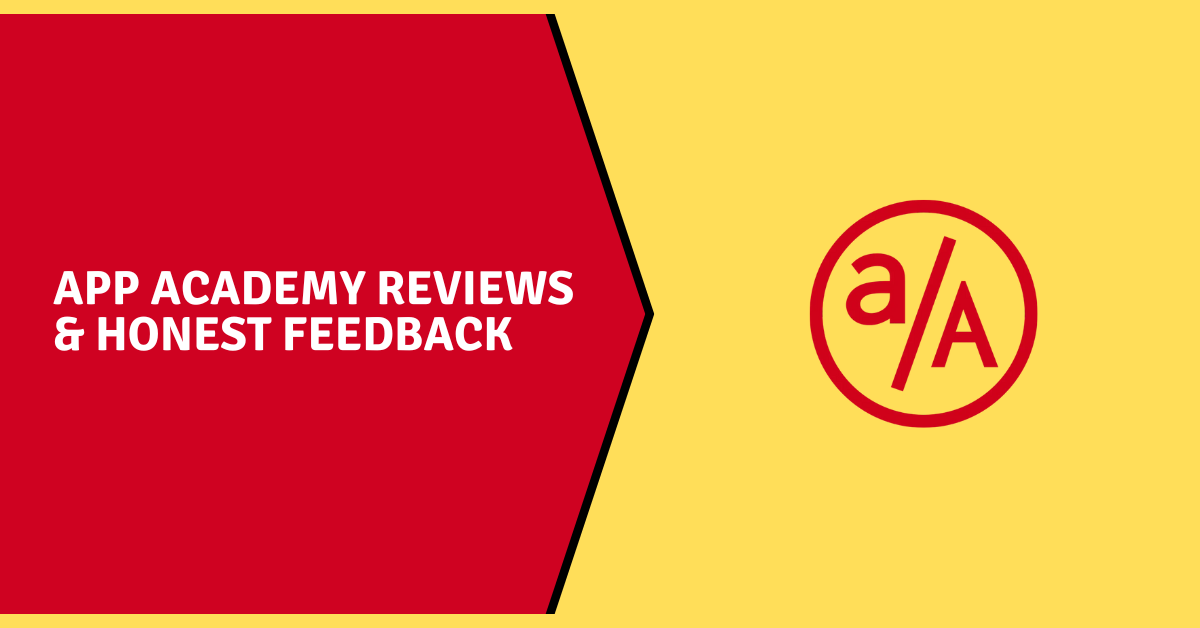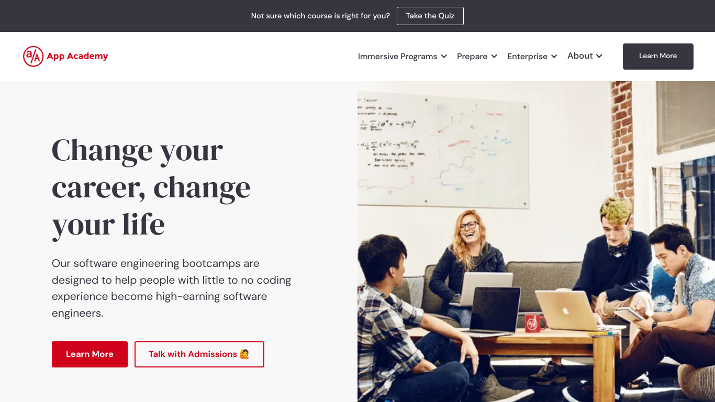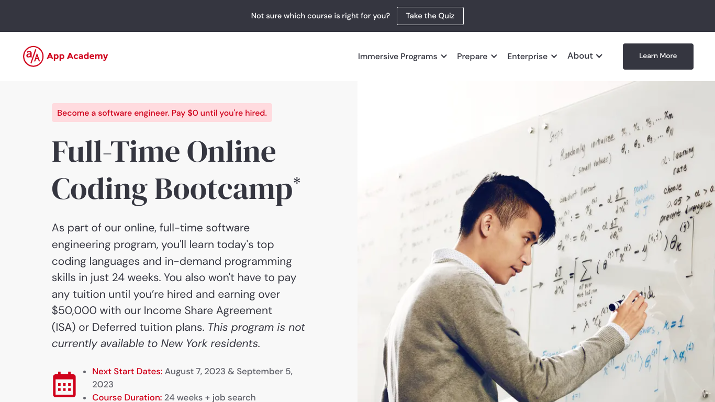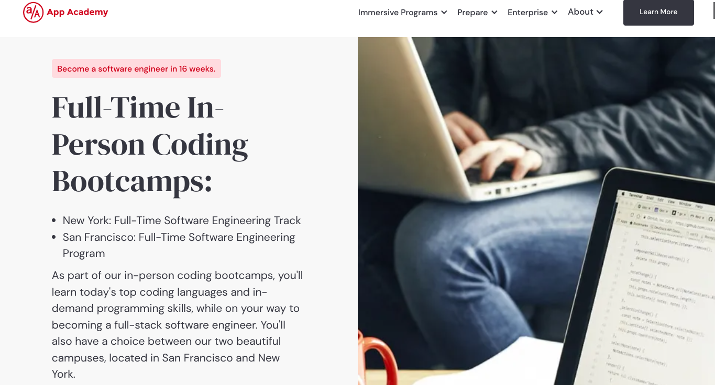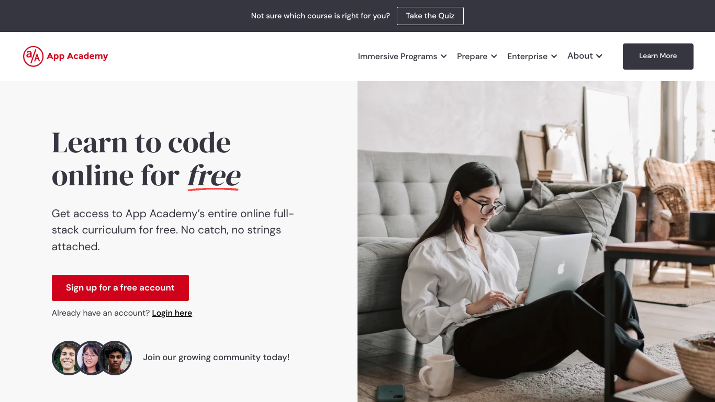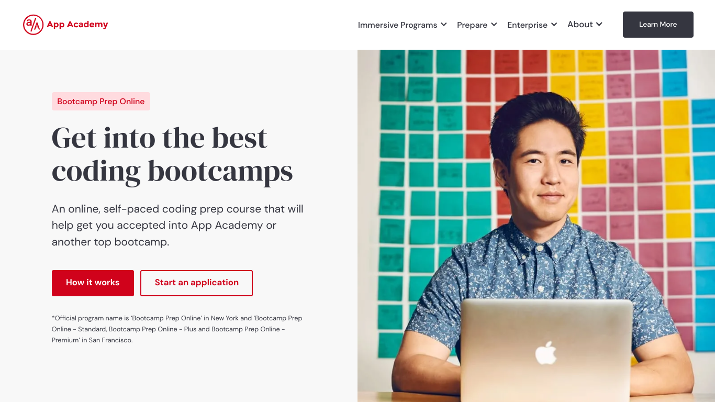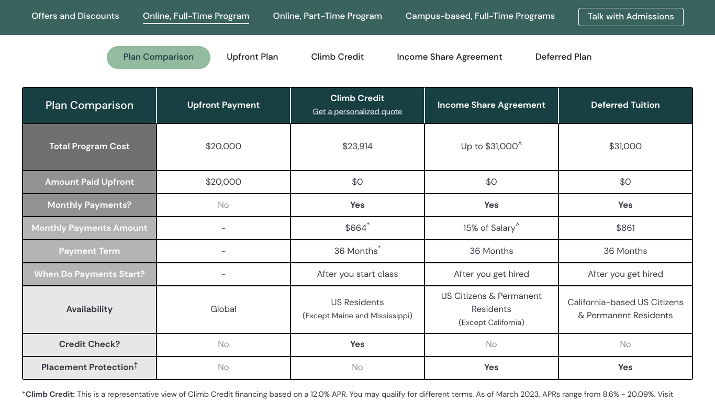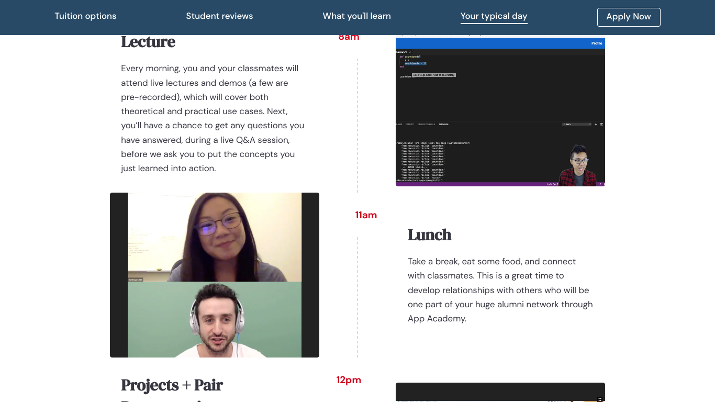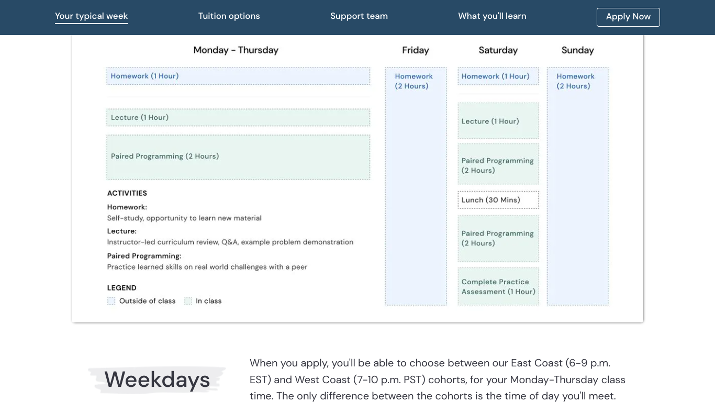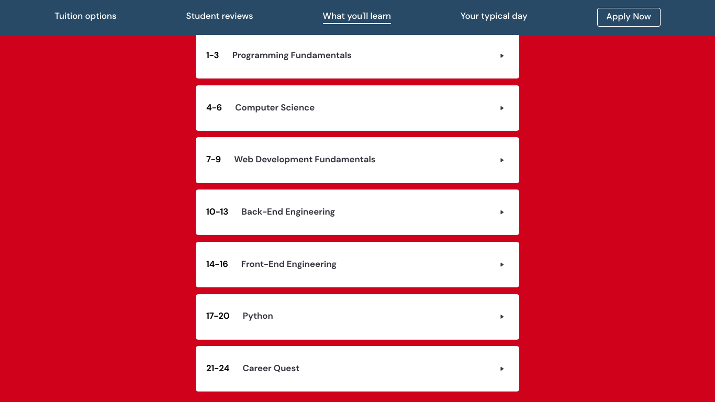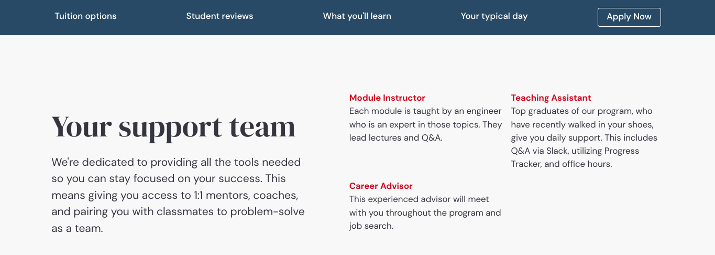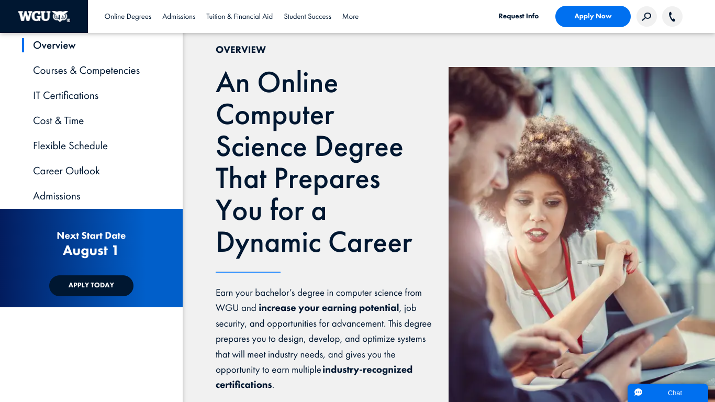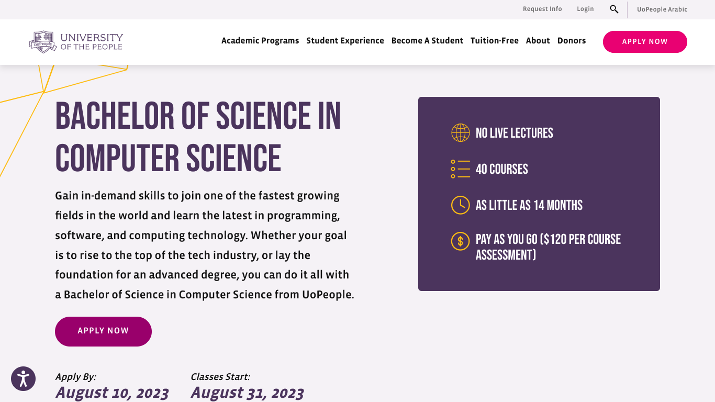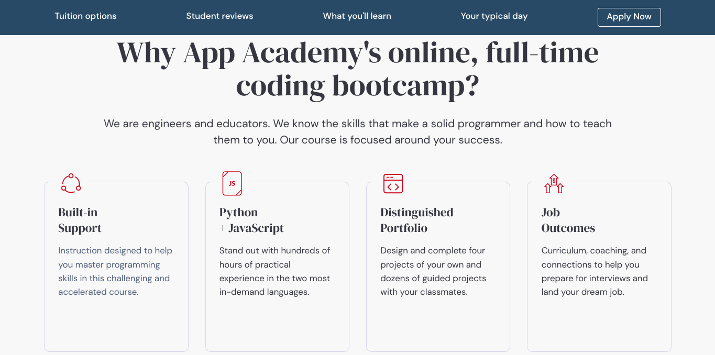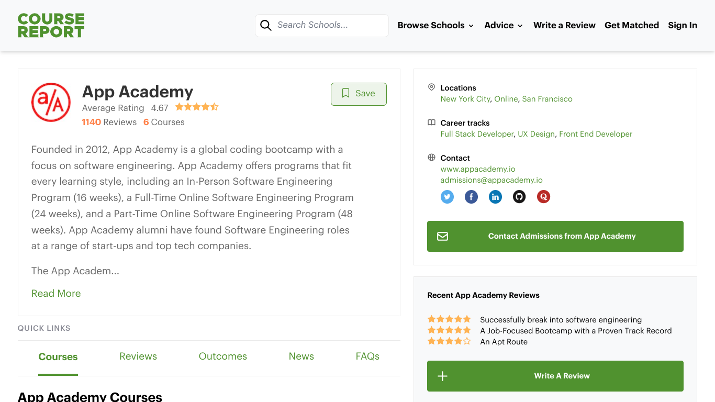Breaking into the IT and computer science sector these days without a bachelor’s degree isn’t easy. Due to the influx of people rushing into the IT sector, the current job market is quite challenging and saturated.
Attending a bootcamp is a solid alternative to a degree, but it’s essential to choose the right one. A good bootcamp will look good on your resume, but more importantly, it will give you the skills you need to do your job successfully once you do land an entry-level position.
App Academy has been around since 2012. It is one of the most well-known coding bootcamps, offering programs of various lengths that are designed to turn newbies into expert coders with knowledge of Java, Ruby, Python, and more.
However, is App Academy worth the price, or are there better alternatives that will give you a better coding education?
In this article, I will review App Academy, including the free and paid versions. That way, you’ll have a better understanding of whether it’s the right choice for your education.
The short version: App Academy is excellent if you choose the free version. However, the paid versions aren’t worth it, in my opinion, as there are better options available.
Read on for the full scoop.
Program Overview
Let’s start with a quick introduction to the different programs offered by App Academy. Within App Academy, there are numerous programs available, including both free and paid ones.
Online Immersive Programs
The online program at App Academy has two versions: the full-time one and the part-time one. The full-time program lasts 24 weeks, while the part-time version lasts 48 weeks.
Classes for the immersive part-time program are offered during the evenings and on Saturdays, allowing people who are working full-time to get a coding education.
Meanwhile, classes for the full-time program are offered throughout the day, starting with a morning lecture and continuing with other activities, such as projects you work on with peers. For the full-time program, you should be available from 8 AM to 5PM (PST) on weekdays.
The programs include live lectures, Q&As with lecturers, help from graduates, career advice, homework, and a lot more! The main benefit of choosing the online program is that you can do it from home, you can practice with pair programming, and you also get one-on-one assistance.
Note that the online program is not available to New York residents.
In-Person On-Campus Program
The in-person full-time program is offered in New York and San Francisco. There are many benefits to joining the in-person bootcamp.
Some people just learn better in person. You can ask questions, communicate with peers, and get hands-on assistance on a level that isn’t possible online, even if you attend Zoom calls or live lectures.
Other people enjoy the community-based aspect and the chance to network with other students.
Finally, a major benefit of the in-person program is that you can complete it in just 16 weeks instead of 24 weeks, which is how long the full-time online program lasts. Due to being there in person, you will learn faster and cover the curriculum quicker.
That means you can get ready to code and graduate from App Academy in around just four months! If you need a job quickly, this might be a better option for you – if you live in New York or San Francisco.
App Academy Open (Self-Paced)
All of the above programs are paid programs. I will discuss pricing in a bit.
However, there is also an online version of the program, called App Academy Open, that is entirely free. This program is self-paced and will take around a year to complete if you dedicate around 10 hours a week to it.
There are no catches – the program is entirely free. However, it lacks all the benefits you would get with one of the immersive programs, such as pair programming, the ability to ask questions, a student community, and career assistance.
Still, for those who otherwise can’t afford any of the paid programs, even with the tuition assistance options and payment plans offered, it could be a good option. It covers the same core curriculum as the immersive programs, but you will be missing a lot of other information, such as homework assignments and projects.
So, expect to struggle a bit more if doing it by yourself.
With over 500 hours of content, you can learn a lot. Nevertheless, you won’t come out with the same skills and experience as you would if you were to attend the paid program.
Also Read: Best LeetCode Alternatives
Bootcamp Prep
Finally, there is a Bootcamp Prep course, which is available online or in person in New York or San Francisco.
The online version has around 70 hours of content, but it is entirely self-paced. The in-person version is designed to last for weeks.
The Bootcamp Prep course doesn’t actually prepare you for a career in computer science. Instead, it is designed to help you prepare for acceptance into the main immersive programs.
Not everyone is accepted into App Academy. According to Best Colleges, it has an acceptance rate of just 5%, which makes it one of the most selective bootcamps.
To get accepted by the admissions team, you will have to undergo various assessments and interviews, including:
- A non-technical assessment that tests things like logical reasoning skills
- A coding challenge that lasts one hour
- A technical interview that involves two coding prompts and a pairing challenge
- A non-technical interview
If you have zero knowledge of coding, you probably won’t get in. You need to have some basic skills, and that is what the Bootcamp Prep course will prepare you for.
It is one of the ways that App Academy makes money.
Tuition Payment Options
The App Academy Open course, which is self-paced, is free. However, the paid programs do cost quite a bit of money.
Prices usually vary. The base price is $17,000 for the in-person bootcamp, $20,000 for the full-time online program, and $22,000 for the part-time online program.
However, that is if you pay upfront. There are a few other payment models:
- Payment plans with Climb Credit: You may qualify for a payment plan with Climb Credit. You can pay over 36 months (actual time may vary based on what payment plan you qualify for). You will have to pay interest, though, and the interest rate will depend on your credit score.
- A loan from Climb Credit: If you are not a US citizen or resident, you must pay upfront; no other options are available. However, you may qualify for an upfront loan of $20,000 from Climb Credit. You can use that loan to pay for your tuition upfront and then pay Climb Credit back.
- Installment Share Agreement: App Academy pioneered an installment payment agreement option. You won’t have to pay anything for the immersive program until you are hired. Then, you will have to pay a percentage of your income (such as 15%) for 36 months, not to exceed a certain amount.
- Deferred payment: If you are in California, you do not qualify for the Installment Share Agreement. Instead, you qualify for the deferred payment plan, which is pretty similar, except that you will have to pay a flat monthly fee once you are hired instead of a percentage of your income.
- Hybrid plan: Under the hybrid plan, you pay a certain amount upfront, and then you pay the rest later, once you have landed a job.
- Scholarships: If you live in San Jose, California, and are part of an underrepresented minority in tech, you may qualify for a scholarship.
App Academy offers a Placement Protection guarantee for the deferred payment and Installment Share Agreement options.
Under this guarantee, you won’t have to pay anything to App Academy if you don’t get a job within 36 months after completing the online program (or 15 months after completing the in-person program) that pays at least $50,000.
However, you must demonstrate that you completed a Good Faith Job Search. You can’t just sit around and expect not to be charged if you didn’t actively search for a job.
See more details about Placement Protection here.
Note that the above applies to the full bootcamps. For Bootcamp Prep, you must always pay upfront.
For updated pricing and payment options, see the tuition page.
Also, note that if you pay upfront, you will always save money. Paying later with the ISA plan will cost more in the long run, as will paying in installments, as you will have to pay interest.
Also Read: DataCamp vs Codecademy
Teaching Methodology
App Academy has an excellent teaching methodology. The curriculum is well planned, but I will discuss that in another section.
Here are some of the teaching methods you can expect at App Academy:
- Live lectures: The live lectures cover theory and practice.
- Pre-recorded lectures: Some live lectures, but not all, are actually prerecorded.
- Q&A sessions: Before putting anything you learned into practice, there will be a Q&A session after a lecture, so you can ask questions about what you learned.
- Lunch breaks: For the full-time program, you will get lunch breaks during which you can connect with your peers digitally or just chill.
- Pair programming: Pair programming allows you to get hands-on experience working with classmates on projects, using what you just learned in online classes.
- Group reviews: Group reviews allow you to discuss what you learned with classmates.
- Homework: Homework prepares you for the next day.
You will get practical experience and the chance to build four websites/projects as part of your coding journey. You can use these projects in your portfolio to show potential employers your skills while applying for a job.
The balance of classes and hands-on practice will prepare you for a position as a software engineer, just like a degree would. However, a full degree in computer science will teach you a lot more than what you will learn in a bootcamp, as you would learn other aspects of computer science as well, in addition to coding and software engineering.
Curriculum and Course Content
I’m not going to sugarcoat anything. App Academy is incredibly intensive and covers a lot; it is difficult and not easy. Just because it is online doesn’t mean you can just casually put the effort in and expect to learn all the content.
It is a real bootcamp and goes very in-depth into coding and software engineering, covering multiple languages. Here is the course content you can expect to cover during the in-person program.
- Learn Ruby concepts to solve algorithms
- Learn Object-oriented programming with inheritance and modules
- Use SQL and ActiveRecord to build databases
- Use Rails to build full-stack apps and implement user authentication
- Learn Javascript and use it to build websites
- Learn React and Redux to manage front-end applications
- Build a full-stack project
If you take the full-time or part-time online course or use App Academy Open, here is what you can expect the curriculum to cover:
- Programming, coding, Javascript, etc.
- Computer science, including algorithms, data structures, etc.
- Web development, including CSS, HTML, HTTP, etc.
- Back-end and front-end engineering, including SQL, React, Redux, Web Sockets, etc.
- Python
- Career preparation, which includes creating a portfolio project, learning how to pitch to potential employers, etc.
Meanwhile, the Bootcamp Prep program mostly teaches you JavaScript – including advanced JavaScript – and web development. It also focuses on how to prepare for interview questions and how to ace your interview and assessment when applying to App Academy.
Also Read: DataCamp Review
Instructor Quality
App Academy has good instructors. During your course, you will get access to:
- Module instructors, who are engineers themselves and experts in the subjects they teach
- Teaching assistants, who are top graduates of App Academy and can assist you in your studies
- Career advisors who can help you with your job search
Note that if you join App Academy Open, which is the free version, you won’t get access to live help from instructors or assistants.
As for the curriculum itself, it’s decent for the free version. However, if you are paying for the live immersive programs, I would probably look elsewhere.
The immersive program costs around the same much as a college degree but doesn’t give you one. You can get a bachelor’s at a community college or an accredited online university such as Western Governors University at that price or for much lower, especially if you have credits you can transfer.
You can even get a tuition-free computer science degree at University of the People (it’s not actually free, as you have to pay for proctored exams, but it’s a fraction of the price of App Academy).
While University of the People is nowhere near as respected in the computer science industry as Western Governors University, it is still an accredited university; both are nonprofits.
Also Read: DataCamp vs Udemy
The curriculum at App Academy is more restricted than a college degree in computer science, and many people have complained about the curriculum quality.
Job Placement and Career Support
App Academy provides career support, including access to a career advisor and modules in the curriculum dedicated to helping you find a job. You will even build a personal portfolio, although it likely won’t be enough to stand out from other candidates if you don’t have a bachelor’s degree.
According to App Academy, it has a job placement rate of 93–95% for all students who participate in a job search. However, it is hard to trust that statistic because bootcamps tend to inflate their job success rates, and the data is only based on students who did the in-person program, who are likely to be more motivated.
It’s also easier for students who attend the in-person bootcamp to get assistance, so they might be better prepared for job interviews.
Furthermore, the data is several years old, and the job market has become a lot more competitive since then. Therefore, I would take that statistic with a grain of salt.
Explore: DataCamp vs Pluralsight
Student Experience and Satisfaction
Before we wrap up this article, let’s take a look at some student reviews so we can see what graduates are saying about App Academy.
Reviews on platforms like CourseReport, Yelp, and SwitchUp are generally positive. However, if you dig a bit deeper, you will find a lot of unsatisfied students.
One Redditor created a post that compiled a lot of the bad experiences users had. They included rude instructors, a curriculum that was poor or lacking, instructors who were not qualified or did not have much experience, high failure rates and difficult exams, and a general bad attitude from staff, who often went on power trips and bullied students.
Most students had a positive experience, but if you think that paying $20,000+ for a coding bootcamp is worth it, I would advise you to consider Western Governors University instead, which is a legitimate online university that will give you a real bachelor’s degree in computer science, cybersecurity, or IT.
An IT degree will cost around $29,000 at Western Governors University, which may be actually less than what you will pay for App Academy if you are not paying upfront.
If you already have transferable credits, it will be even less, and financial aid may be available as well. As you can see in this Reddit thread, some people paid less than $20,000 or even less than $8,000.
It will take longer than a bootcamp, but you can finish it quickly if you have credits or study hard.
You can also take as many courses as you want per semester while paying a flat rate per semester, so you can finish quickly and save money by applying yourself. One Redditor got his bachelor’s in just over a month!
Also Read: DataCamp vs Udacity
Recap – App Academy Reviews
Overall, if you are looking for a free coding bootcamp, I do recommend the self-paced App Academy Open. It’s free, and you will earn a lot if you are willing to apply yourself.
However, I wouldn’t recommend the immersive programs. They’re simply not worth the money, especially with so many resources available for free these days, such as The Odin Project.
If you want to pay money, there are online universities that are accredited and will give you an actual bachelor’s degree. They may take longer than App Academy, but you can finish quicker if you apply yourself, and you may end up paying a lot less; it will also help you stand out from other candidates.
